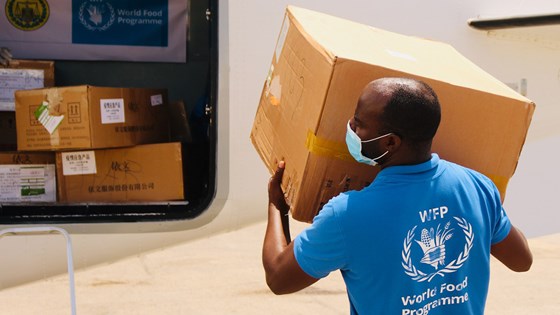Helping the most vulnerable
Historical archive
Published under: Solberg's Government
Publisher: Ministry of Foreign Affairs
Article | Last updated: 27/04/2020
The United Nations has estimated that nearly 170 million people will require humanitarian assistance in 2020. Norway has therefore set aside more money, made advance payments and granted extra flexibility to humanitarian organisations, thus enabling them to respond more effectively to direct and indirect effects of the pandemic.

The coronavirus pandemic is aggravating hardships faced by populations in countries and regions already affected by humanitarian crises. Refugees and internally displaced persons are highly vulnerable to infection even as they continue to need protection, shelter, food, water and basic health services.
Norway has therefore set aside more money, made advance payments and granted extra flexibility to humanitarian organisations, thus enabling them to respond more effectively to direct and indirect effects of the pandemic.
Humanitarian efforts
Norway’s combined 2020 humanitarian budget amounts to some NOK 5.5 billion, an amount sufficient to assist with emergencies and crises in a variety of countries.
The Government recently entered strategic partnerships with the Norwegian Refugee Council, Norwegian Church Aid, Norwegian People’s Aid, Save the Children and Caritas Norway. The four-year agreements have an annual upper limit of NOK 1.7 billion and provide the organisations with predictability and flexibility. This will help to improve the response to the many complex, long-term crises the world now faces, including the coronavirus pandemic.
Norway is one of the largest contributors to the UN’s Central Emergency Response Fund (CERF). The fund ensures that assistance is quick to arrive in sudden-onset humanitarian crises and provides much-needed support for underfunded emergencies. On 11 February Norway provided NOK 420 million to CERF as part of a four-year agreement between Norway and the fund amounting to almost NOK 1.7 billion.
Norway to date has contributed a combined NOK 100 million in earmarked funds for the UN’s global humanitarian Covid-19 response plan.
Norway has also contributed NOK 30 million in response to Covid-19 appeals by the Red Cross & Red Crescent Movement.
Through its strategic partnership with Norwegian Church Aid, Norway has provided NOK 14 million in extra Covid-19 funding for 10 vulnerable countries.
Due to a desperate lack of health-care personnel as the coronavirus attacked Italy’s Lombardy region, Norway dispatched a team of 16 doctors and nurses to assist Italian medical professionals for four weeks.